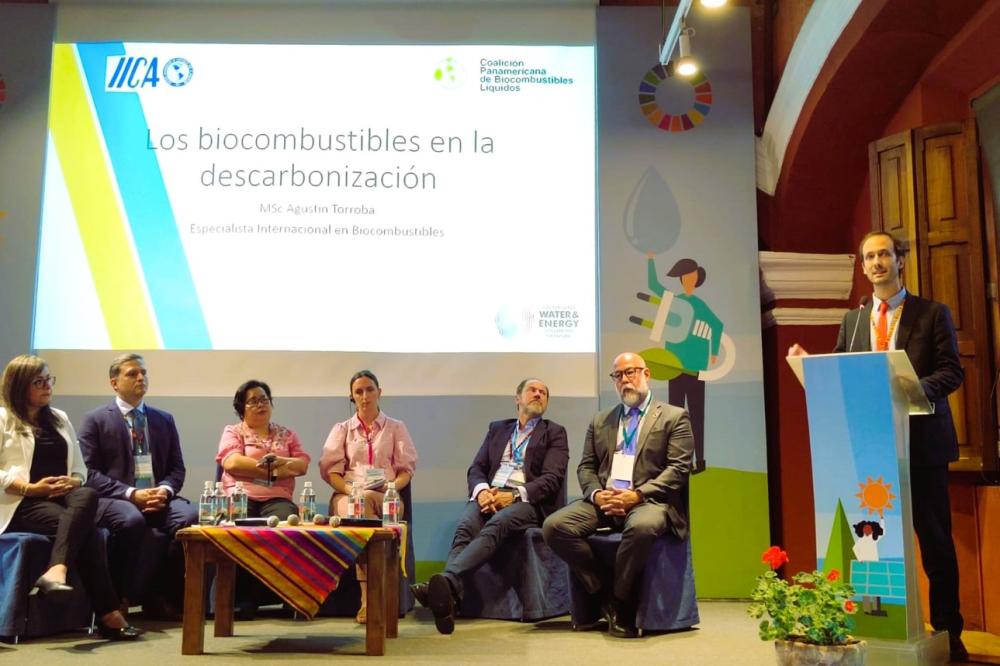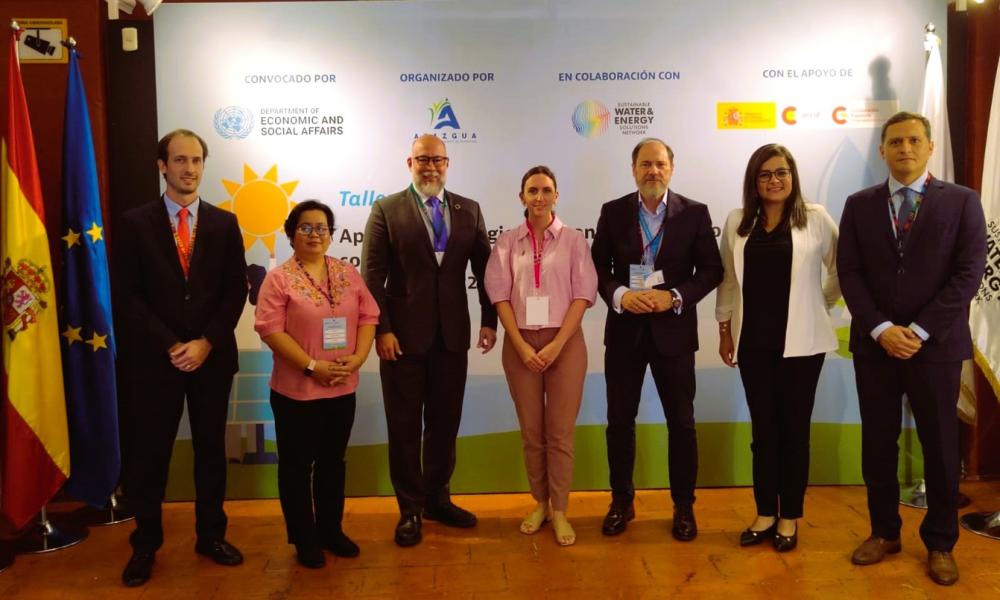Synergy of water and energy shows that ethanol can contribute to decarbonization in all Latin American countries

Antigua, Guatemala – 25 October 2024 (IICA) – The United Nations Department of Economic and Social Affairs, the Guatemalan Sugar Producers Association (ASAZGUA), the Sustainable Water and Energy Solutions Network, the Spanish Embassy in Guatemala, and the Spanish Agency for International Development Cooperation (AECID) held the Global Workshop “Synergistic Application of Sustainable Water and Energy Consumption and Production for Achieving the 2030 Agenda and the Paris Agreement” in Antigua, Guatemala.
Agustín Torroba, International Biofuels Specialist at the Inter-American Institute for Cooperation on Agriculture (IICA) and Executive Secretary of the Pan American Liquid Biofuels Coalition (CPBIO), participated in the session on “Sustainable Consumption and Production of Water and Energy – Environmental Interrelations and Climate Change,” which addressed the environmental implications, including those related to climate change and biodiversity, of actions and policies promoting sustainable consumption and production of water and energy, highlighting the synergies and efficiencies that can be obtained with an integrated approach to the water-energy nexus.
The Pan American Liquid Biofuels Coalition (CPBIO) comprises major business and industrial associations in the Americas dedicated to the production and processing of sugar, alcohol, corn, sorghum, soy, vegetable oil, and grains, among other agricultural products. Its main objectives are to coordinate the sustainable development, promotion, and consumption of these clean energies throughout the hemisphere.
Torroba participated in the workshop alongside Mariano González (CEO, Canal de Isabel II, Community of Madrid, Spain), Anneli Alatalo Paulsen (Director of the Global Sustainable Development Business Initiative, SINTEF, Norway), Alice Jipius (Executive Director, Tonibung, Malaysia), Jorge Asturias (Project Coordinator, Readiness-GCF, GIZ, Guatemala), and Zaida Solano (Director of Sustainability, LAICA, Costa Rica), who presented case studies from their respective countries.
In the panel, the CPBIO stated that it is highly likely that the objectives of the Paris Agreement will not be met; that the impacts of climate change on the economy are worse than previously thought, as a 1°C increase in temperature could lead to a 13% decline in GDP; that liquid biofuels are the best solution for decarbonizing transportation in Latin America—which accounts for 40% of greenhouse gas (GHG) emissions—; and that biofuels are an immediately available technology for decarbonizing transportation, requiring no modification to engines, being affordable, sustainable, and supported by the availability of surplus biological resources in our countries, which would facilitate large-scale biofuel industrialization and thus substitute the import of fossil fuels.

Ivanova Ancheta, Executive Director of the Guatemalan Alcohol Producers Association (APAG), outlined the expectations of the biofuels sector regarding the progress of ethanol blending in her country. Guatemala is one of the top ten ethanol producers in Latin America, with 70 million gallons of alcohol produced annually. “We aspire for Guatemala to play a significant role in supplying sustainable aviation fuel (SAF) in the region,” Ancheta emphasized.
Juan Carlos Fernández, Executive Director of the Central American Sugar Producers Association (AICA), highlighted their commitment to promoting biofuels and the benefits that developing this industry brings to the region.
Aida Lorenzo, Director of the Guatemalan Renewable Fuels Association (ACR), emphasized the potential of sugarcane in energy and fuel production. “Guatemala has been producing ethanol sustainably for over 38 years, recognized internationally as ‘advanced ethanol,’ so it has enormous potential that should be supported by national legislation. According to the regulations issued last year to comply with Law 17-85, blending should begin on January 1, 2026. We hope that Guatemala will be the first to start a 10% blend in gasoline,” Lorenzo added.
“Biofuels are a combination of carbon capture with solar energy capture, which through the photosynthesis of plants allows the production of raw materials for these biological fuels with a carbon intensity much lower than that of the fossil fuels they replace. The synergy of water and energy we observed at this event demonstrates that ethanol can contribute to decarbonization in all Latin American countries, especially sugarcane and other crops, which could significantly reduce GHG emissions in the transport sector and facilitate the achievement of the 2030 Agenda and the objectives of the Paris Agreement,” concluded Torroba.
More information:
Institutional Communication Division.
comunicacion.institucional@iica.int